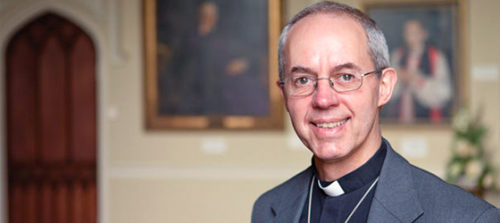Durham Bishop Justin Welby named 105th archbishop of CanterburyPosted Nov 9, 2012 |
|
[Episcopal News Service] Following months of anticipation and media speculation, Downing Street confirmed Nov. 9 that the Queen has approved the nomination of Diocese of Durham Bishop Justin Welby as the 105th archbishop of Canterbury.
As the 105th archbishop in a succession spanning more than 1400 years, Welby will assume the multi-faceted role as spiritual leader of the Anglican Communion, Primate of All England, and bishop of the Diocese of Canterbury.
Church of England bishops are appointed rather than elected, with a 16-member Crown Nominations Commission putting forward two names — a preferred candidate and a second candidate — to Downing Street. The U.K. prime minister then seeks approval from the British monarch, who is the supreme governor of the Church of England.
Before his ordination to the priesthood in 1992, Welby studied law and history at Cambridge University and then spent 11 years as an executive in the oil industry. After a decade in parish ministry, he was appointed a canon residentiary, and later sub-dean, of Coventry Cathedral. He served as dean of Liverpool Cathedral from 2007-2011.
As bishop of Durham, the fourth-most-senior position in the Church of England to which he was consecrated in October 2011, Welby is automatically granted a seat in the House of Lords.
Welby, 56, will succeed the Most Rev. Rowan Williams, who will step down at the end of the year after serving as the 104th archbishop of Canterbury since February 2003. Williams has accepted a new post as master of Magdalene College, Cambridge.
Welby’s enthronement as 105th archbishop of Canterbury will be held March 21, 2013, in Canterbury Cathedral.
Welby is married to Caroline and they have five children, aged 16-27.
[An ENS article with reactions to Welby’s appointment and reflections on Williams’ 10-year tenure is available here.]
“I don’t think anyone could be more surprised than me at the outcome of this process,” said Welby, according to a Lambeth Palace press release. “It has been an experience, reading more about me than I knew myself. To be nominated to Canterbury is at the same time overwhelming and astonishing. It is overwhelming because of those I follow, and the responsibility it has. It is astonishing because it is something I never expected to happen.
“One of the hardest things will be to leave Durham. I work with a group of wonderful senior colleagues and remarkable clergy and lay people. It is an astonishing part of the country, one which as a family we were greatly looking forward to living in for many years. The people are direct, inspiring and wonderfully friendly. In many ways it has been the ancient cradle of British Christianity. It is a place of opportunity and an even greater future than its past.”
Williams issued said he is “delighted at the appointment … I have had the privilege of working closely with [Welby] on various occasions and have always been enriched and encouraged by the experience.
“He has an extraordinary range of skills and is a person of grace, patience, wisdom and humor. He will bring to this office both a rich pastoral experience and a keen sense of international priorities, for Church and world. I wish him – with Caroline and the family – every blessing, and hope that the Church of England and the Anglican Communion will share my pleasure at this appointment and support him with prayer and love.”
Presiding Bishop Katharine Jefferts Schori said: “I am delighted to hear of Bishop Welby’s appointment as archbishop of Canterbury. He brings knowledge of the immense challenges of the world in which the Anglican Communion seeks to partner in the service of God’s mission to heal and reconcile.”
Jefferts Schori noted that Welby has experience of churches in several parts of the Anglican Communion, “which should serve him well. The bishops of The Episcopal Church have met him and shared fruitful conversation, worship, and learning with him during a House of Bishops meeting earlier this year. We also welcomed him to our General Convention in 2009.
“I give thanks for his appointment and his willingness to accept this work, in which I know his gifts of reconciliation and discernment will be abundantly tested. May God bless his ministry, shelter his family, and bring comfort in the midst of difficult and lonely discernment and decisions.”
President of the House of Deputies the Rev. Gay Clark Jennings told ENS that at every international gathering of Anglicans that she has attended, she has come away with the same conviction — that most of the people in the Anglican Communion are eager “to work together for the sake of the gospel whatever our difference over specific theological points. We need an archbishop of Canterbury who wants to facilitate that cooperation and encourage the partnerships that are waiting to be born.”
Jennings said that Welby “is held in high regard” by Episcopalians who know him well.
“As a conflict negotiator, he has demonstrated extraordinary courage and unusual skill in persuading people with far greater differences than those within the Anglican Communion to work together and to reconcile,” she said. “This gives me hope that he is the right person for this challenging moment in the Anglican Communion’s history.”


Social Menu